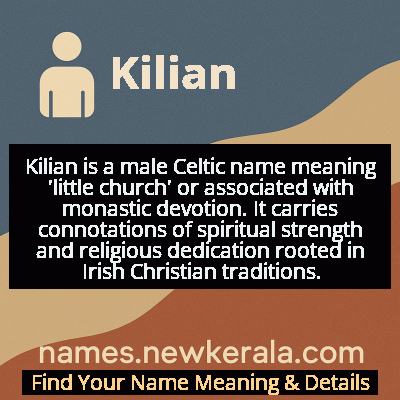Kilian Name Meaning & Details
Origin, Popularity, Numerology Analysis & Name Meaning of Kilian
Discover the origin, meaning, and cultural significance of the name KILIAN. Delve into its historical roots and explore the lasting impact it has had on communities and traditions.
Name
Kilian
Gender
Male
Origin
Celtic
Lucky Number
2
Meaning of the Name - Kilian
Kilian is a male Celtic name meaning 'little church' or associated with monastic devotion. It carries connotations of spiritual strength and religious dedication rooted in Irish Christian traditions.
Kilian - Complete Numerology Analysis
Your Numerology Number
Based on Pythagorean Numerology System
Ruling Planet
Moon
Positive Nature
Diplomatic, friendly, artistic, empathetic.
Negative Traits
Over-sensitive, moody, indecisive, prone to self-pity.
Lucky Colours
Green, cream, white.
Lucky Days
Monday.
Lucky Stones
Pearl, moonstone.
Harmony Numbers
1, 3, 4.
Best Suited Professions
Diplomats, mediators, caregivers, artists.
What People Like About You
Cooperative spirit, friendliness, artistic talent.
Famous People Named Kilian
Saint Kilian
Missionary Bishop
Irish apostle of Franconia who Christianized much of Bavaria and was martyred in Würzburg
Kilian Jornet
Professional Mountain Runner
World-renowned ultrarunner and skier who holds multiple records for speed ascents of major mountains
Kilian Hennessy
Perfumer and Businessman
Founder of the luxury perfume house By Kilian and heir to the Hennessy cognac empire
Kilian Eng
Digital Artist and Illustrator
Renowned Swedish digital artist known for his sci-fi and fantasy illustrations featured in major publications
Name Variations & International Equivalents
Click on blue names to explore their detailed meanings. Gray names with will be available soon.
Cultural & Historical Significance
The name's journey from Ireland to continental Europe represents the significant cultural exchange during the early Middle Ages when Irish monks played crucial roles in preserving classical knowledge and spreading Christianity. In Ireland, the name remained prominent through figures like Saint Cillian of Disert-Killine, while in Germany, Saint Kilian became the patron saint of Würzburg, with his feast day celebrated on July 8th. This dual heritage gives the name a unique position bridging Celtic and Germanic cultures, embodying both Irish spiritual traditions and continental European Christian history.
Extended Personality Analysis
Individuals named Kilian are often perceived as possessing a unique blend of spiritual depth and adventurous spirit. They tend to be introspective and thoughtful, with a strong sense of purpose that guides their actions. This combination of contemplation and action mirrors the historical Saint Kilian, who combined deep faith with courageous missionary work. Many Kilians demonstrate remarkable determination and resilience, able to pursue long-term goals with consistent effort and patience.
Socially, Kilians often exhibit quiet confidence rather than overt extroversion. They typically form deep, meaningful relationships rather than numerous superficial ones, and their loyalty to friends and family is notable. There's often an artistic or creative dimension to their personality, whether expressed through traditional arts, innovation in their professional field, or unique problem-solving approaches. Their Celtic heritage seems to manifest in a connection to nature, storytelling traditions, and a certain mystical sensibility that others find intriguing and compelling.
Modern Usage & Popularity
In contemporary times, Kilian has experienced a notable resurgence, particularly in Europe and among parents seeking names with historical depth and cross-cultural appeal. The name maintains strong popularity in German-speaking countries, especially in Bavaria where Saint Kilian remains an important religious figure. In recent years, it has gained traction in France, the United States, and other English-speaking countries as parents look for distinctive yet established names. The spelling 'Killian' has become more common in English contexts, while 'Kilian' remains preferred in German regions. Current naming trends show increased interest in Celtic names with international versatility, positioning Kilian favorably. Its usage spans various social classes and appears in both urban and rural settings, though it particularly appeals to educated, cosmopolitan families who appreciate its historical significance and melodic quality.
Symbolic & Spiritual Meanings
Symbolically, Kilian represents the bridge between spiritual contemplation and worldly action. The name embodies the concept of 'journeying faith' - the idea that spiritual growth occurs through both inner reflection and outward mission. It carries connotations of cultural exchange and adaptation, symbolizing how traditions can travel across borders while maintaining their core identity. The name also suggests the balance between tradition and innovation, reflecting how ancient names can find renewed relevance in modern contexts. In metaphorical terms, Kilian represents the integration of Celtic mystical sensibilities with structured European Christian traditions, creating a unique synthesis of intuitive wisdom and disciplined practice. The name's association with both Irish monasticism and German sainthood gives it layered symbolic meaning as a unifier of different cultural streams.

